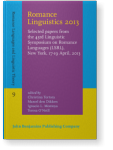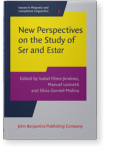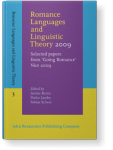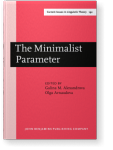Norberto Moreno-Quibén
List of John Benjamins publications for which Norberto Moreno-Quibén plays a role.
2023 Perspectivized estar -sentences with aesthetic adjectives across American Spanish varieties Copulas in Spanish and Beyond, Gumiel-Molina, Silvia and Isabel Pérez-Jiménez (eds.), pp. 313–342 | Article
The article describes the behavior of aesthetic adjectives (bonito ‘beautiful’) in the so-called innovative constructions with estar ‘be
estar
’, documented in some American varieties of Spanish. These innovative structures (El poema está bonito ‘The poem is beautiful’) do not… read more
2016 Depictive secondary predicates in Spanish and the relative/absolute distinction Romance Linguistics 2013: Selected papers from the 43rd Linguistic Symposium on Romance Languages (LSRL), New York, 17-19 April, 2013, Tortora, Christina, Marcel den Dikken, Ignacio L. Montoya and Teresa O'Neill (eds.), pp. 139–158 | Article
This study accounts for the unacceptability of individual-level gradable adjectives as (depictive) secondary predicates on the basis of two factors: (a) the semantics of gradable adjectives—specifically the way their comparison classes are formed in the syntax, giving rise to the difference between… read more
2015 The inference of temporal persistence and the individual/stage level distinction: the case of ser vs. estar in Spanish New Perspectives on the Study of Ser and Estar, Pérez-Jiménez, Isabel, Manuel Leonetti and Silvia Gumiel-Molina (eds.), pp. 119–146 | Article
In this paper we propose that the differences between ser ‘beSER’ and estar
‘beESTAR’ predications traditionally associated with the individual-level/stagelevel
(IL/SL) distinction (having to do with their differing combinations with
adverbs quantifying over situations, locative and temporal… read more
2011 Sentential coordination and ellipsis: Free exceptives in Spanish Romance Languages and Linguistic Theory 2009: Selected papers from 'Going Romance' Nice 2009, Berns, Janine, Haike Jacobs and Tobias Scheer (eds.), pp. 255–272 | Article
In this paper we provide a syntactic analysis of free exceptive constructions headed by excepto and salvo (‘except’) in Spanish: Todos los estudiantes cantaron, {excepto/salvo} Juan (‘Every student sang, except John’). Our claim is that free exceptives are coordinated elliptical sentences attached… read more
2001 A/A-bar Movement and Attract-F The Minimalist Parameter: Selected papers from the Open Linguistics Forum, Ottawa, 21–23 March 1997, Alexandrova, Galina M. and Olga Arnaudova (eds.), pp. 295–308 | Article




